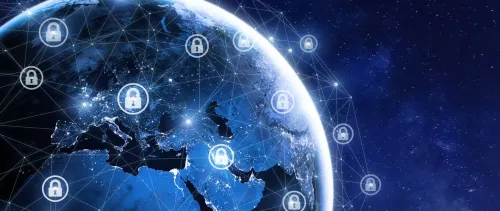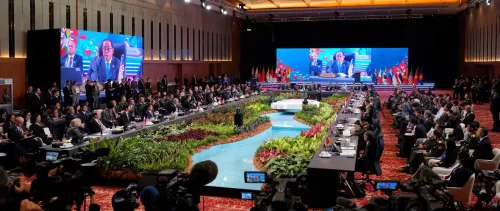
The Global Shapers Community is quietly making the world a better place. Image: Photo by melvin Ankrah on Unsplash
- From climate justice to digital inclusion, young people are organizing, innovating and leading real solutions to the world’s most urgent challenges.
- Founded on a belief that young people could shape the future of their cities and the world, Global Shapers Community members have launched thousands of local solutions to global issues.
- Here are five lessons from this global movement that will help organizations looking to engage young people as true partners in change.
Young people are at the forefront of change worldwide. From climate justice to digital inclusion, young people are organizing, innovating and leading real solutions to the world’s most urgent challenges.
This International Youth Day, 12 August 2025, the theme is Local Youth Action for the SDGs. This is a call to action for governments, institutions and businesses to recognize and support young people’s leadership – not just in principle, but in practice.
One powerful example is the Global Shapers Community, a network of 10,000 young people, aged under 30, organized across 500 cities in 150 countries and territories, supported by the World Economic Forum and its diverse partners.
Founded 15 years ago on a bold belief that – given the platform, tools and trust – young people could shape the future of their cities and the world, members have since launched thousands of local solutions to global issues.
Here are five lessons from this global movement that will help organizations looking to engage young people as true partners in change.
1. From symbolic inclusion to structural influence
Around the world, young people are too often invited into decision-making spaces for optics, rather than influence. Real partnership requires moving beyond symbolic inclusion to structural power.
The World Economic Forum is one of the first international organizations to reserve spaces for leaders under 30 at its Annual Meeting in Davos. But real inclusion goes beyond visibility. This is why the Global Shapers Community was created – not just to bring young people into the room, but to ensure they help shape what happens inside it. Today, Global Shapers work alongside global leaders to co-design sessions, contribute to initiatives and collaborate on lasting solutions.
“Being a Global Shaper has allowed young people like me to move from simply engaging out of interest to actively shaping outcomes. We now have meaningful ways to drive structural change through long-term contributions.”— Valeria Tafoya, Member of the León Hub, Mexico and Global Future Council on GovTech and Digital Public Infrastructure
Progress has been hard-won and the work continues.
“Young people today are coming of age amid overlapping crises – with a front-row seat to disruption and a proven record of driving solutions in their communities,” says Dominique Souris, alumna of the London II Hub, UK and member of the Global Future Council on Equitable Transition. “That lived experience offers insight into what’s needed, and what will actually work, making youth indispensable partners in driving systems change.”
In a polarized, fast-changing world, intergenerational parity matters.
2. Embedding young people in core strategy
Global events can spark inspiration, but lasting change demands more than momentary engagement. It requires sustained collaboration, integrating young people into the heart of an organization’s strategy, not just on the sidelines. That’s where movements like the Global Shapers Community thrive.
"After attending events like the Forum’s Annual Meeting of the New Champions and the India Economic Summit, I was able to bring initiatives like 1t.org and Yes Cities to my region," shares Alok Medikepura Anil, Founding Curator of the Mysuru Hub, India. "Living in a fragmented world, Global Shapers bring the optimism and ingenuity to devise local solutions for global problems."
From advancing digital equity through the EDISON Alliance to restoring nature with 1t.org and bridging skills gaps with the Reskilling Revolution, Global Shapers are infusing global strategies with local insights and action, directly contributing to the World Economic Forum’s most ambitious initiatives.
“Global Shapers have equipped 250,000 young people with better education and skills as part of the Forum’s Reskilling Resolution. They show that reskilling is a shared mission – uniting global employers with youth-led solutions and mobilizing a global movement that spans sectors and borders,” says Ostap Lutsyshyn, Forum Education Specialist and alumnus of Lviv Hub, Ukraine.
This isn’t symbolic inclusion – it’s strategic collaboration that scales impact.
To unlock intergenerational innovation, organizations must move youth engagement from the periphery to the core: co-leading flagship initiatives, shaping priorities and influencing the systems they will ultimately inherit.
- What is a Global Shaper?
The Global Shapers Community is a network of young people under the age of 30 who are working together to drive dialogue, action and change to address local, regional and global challenges.
The community spans more than 8,000 young people in 165 countries and territories.
Teams of Shapers form hubs in cities where they self-organize to create projects that address the needs of their community. The focus of the projects are wide-ranging, from responding to disasters and combating poverty, to fighting climate change and building inclusive communities.
Examples of projects include Water for Life, a effort by the Cartagena Hub that provides families with water filters that remove biological toxins from the water supply and combat preventable diseases in the region, and Creativity Lab from the Yerevan Hub, which features activities for children ages 7 to 9 to boost creative thinking.
Each Shaper also commits personally and professionally to take action to preserve our planet.
3. Decentralization powers global innovation
Every city faces unique challenges. That’s why the Global Shapers' model is intentionally decentralized, allowing each hub to lead projects based on local needs. The result is a powerful engine for local innovation with global reach.
Together, Global Shapers implement over 500 local projects each year, from combating plastic pollution in Abuja, Nigeria, to advancing equitable health systems in Chicago, USA and bridging the rural digital divide in Jaipur, India.
“We’re not here to inherit the future. We’re here to co-create it. Transformative change begins when people across generations and geographies share decision-making power.”— Fatima-Zahra Ma-el-ainin, Global Shaper from the Casablanca Hub, Morocco and Co-Lead of the Future50 Initiative
These are not just one-off campaigns; they are sustained actions reaching over 15 million people globally and building real momentum.
"Individually, large-scale impact may feel out of reach. But together, we have the opportunity and responsibility to reshape our global future," says Taylor Hawkins, part of the Sydney Hub, Australia and Global Foresight Network adviser. “Working with the Global Foresight Network has expanded my ambition for what’s possible when we collaborate across generations.”
While the impact is significant, the model is still evolving. Not all hubs have equal access to resources – and we are actively working to close these gaps. True decentralization requires every member has the capacity to engage.
Have you read?
- Future of Jobs Report 2025: What’s shaping the future of the global workforce?
- From politics to innovation: how South Asia’s youth is rewriting its growth story
- 5 pathways towards an optimistic future, according to today's youth
4. Leadership is learned by doing
Leadership does not come with a playbook; it demands agility, resilience and a community of peers.
That’s why the Global Shapers Community is designed as a leadership laboratory that invests deeply in practical, peer-led development – from structured upskilling programmes to digital platforms that foster knowledge-sharing. Learning no longer happens only in the classroom; it unfolds in communities and through real-world collective problem-solving.
"My journey as a Global Shaper became an apprenticeship in leadership shaped by listening and co-creating," reflects Rumaitha Al Busaidi, Muscat Hub alumna, who now serves on the Global Future Council on the Energy Nexus. "Years later, I stood beside global leaders to launch the world’s first liquid hydrogen corridor – and it all started with this community."
Each year, over 500 hub leaders convene for intensive leadership development, building skills to organize action, forge partnerships and drive impact. This convening renews purpose and sparks collaboration. Hub leadership roles are intentionally time-bound to ensure continuity, accountability and fresh ideas.
“The Global Shapers Community grounds global agendas in real-world experience, equipping young leaders with the networks and visibility that create ripple effects far beyond their local contexts and ensuring today’s solutions can be scaled by those closest to the challenges”— Dominique Souris, alumna of the London II Hub, UK and member of the Global Future Council on Equitable Transition
5. Community is the ultimate catalyst
The strongest force behind this movement isn’t funding, it’s fellowship.
Time and again, we’ve seen that peer-to-peer solidarity fuels resilience, unlocks potential and deepens impact. Whether it’s mentoring or offering support during a crisis, Global Shapers show up for each other.
This is the secret to our staying power: not just strong structures, but strong bonds. Not just global reach, but meaningful relationships that make long-term impact across borders possible. Whether mentoring each other, launching cross-hub collaborations, or responding to crises – Shapers consistently show up.
"Being part of a globally linked, impact-driven community creates an unparalleled space for driving structural change and advancing local action with global relevance,” says Thales Dantas, part of the Florianopolis Hub, Brazil.
Looking ahead: Will your organization partner with the next generation – or be left behind?
"With 1.2 billion young people and Gen Z’s spending power set to hit $12 trillion by 2030, the question isn’t whether institutions need to engage youth, but whether young people will wait for those that refuse to share power," says Tariq Al Olaimy, Manama Hub alumnus and Faith in Action Initiative adviser.
Fifteen years in, the Global Shapers Community is proud of what we’ve built – and even more energized by what’s ahead. Because when youth are trusted, connected and equipped, they don’t just imagine a better world – they build it.
Real partnership with young people takes ongoing effort. It means listening, evolving and being willing to share power. The journey is far from over, but the momentum is growing.



